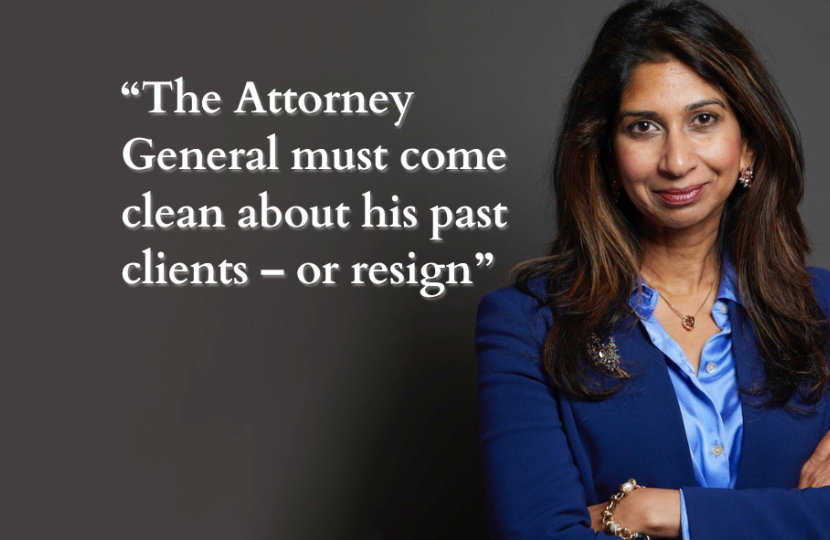
The Telegraph, 17th January 2025
The Attorney General must come clean about his past clients – or resign
If Lord Hermer is to remain in office he must be transparent about his dealings with Gerry Adams and those suing the army
“Hell.” That was how Sir Patrick Hastings, one of Britain’s former Attorneys General, described his brief and turbulent time in the role. Hastings’ tenure, marred by the Campbell Case of 1924, ended in political calamity – a vote of no confidence in Ramsay MacDonald’s Labour government that led to its collapse.
A century later, echoes of Hastings’ plight resonate disturbingly in today’s political and legal landscape.
The office of Attorney General, one of the oldest in British governance dating back to 1247, occupies a uniquely precarious position: both politician and lawyer, the Attorney must serve the government while maintaining the rule of law. As legal advisors to the Crown, Attorneys General are expected to act without fear or favour, their integrity beyond reproach. But this ideal is being sorely tested under the current incumbent, whose actions risk undermining public confidence in the very foundations of our legal system.
Reports of bias, conflicts of interest, and opaque decision-making have dogged the current Attorney General, Richard Hermer KC. The most glaring issue is Lord Hermer’s alleged connection to Gerry Adams, the former Sinn Féin leader. In a revelation that should alarm every taxpayer, it was reported that the Attorney General received approximately £30,000 to represent Adams in legal proceedings – a fact he astonishingly “could not recall” when questioned by the Justice Select Committee.
This is no mere footnote. Adams, a central figure in Northern Ireland’s troubled history, had been denied compensation by legislation enacted by the Conservatives designed to safeguard the interests of British veterans and victims of IRA violence. The Government’s sudden decision to repeal the Northern Ireland Troubles Act 2023 – a law crucial in preventing retrospective payouts to figures like Adams – raises serious questions. Was the Attorney General’s past legal representation of Adams a factor in this policy reversal?
The Law Officers’ Convention, which prevents disclosure of legal advice given to government, offers thin cover. It is inconceivable that such a momentous decision, laden with judicial and financial ramifications, could have been made without the Attorney’s involvement.
As someone who held this role, I know firsthand the gravity of decisions like these. When I worked with ministerial colleagues on the Northern Ireland Troubles Act, it was clear that the legislation was not just about protecting British veterans from vexatious claims but also about drawing a line under decades of bloodshed in Northern Ireland. Repealing it is a betrayal of those principles and an insult to the memories of the victims of the IRA and the brave servicemen and women who upheld the Crown’s authority during the Troubles.
The Attorney General’s entanglements do not stop with Adams. Another alarming conflict involves his previous representation of families alleging murder by British Armed Forces. These allegations, which touch on extrajudicial killings, are central to the ongoing Afghanistan Inquiry – a statutory investigation in which the Government is directly involved.
How can the public trust the impartiality of this Inquiry when the Attorney General, nominally the Government’s chief legal adviser at the Inquiry, has previously represented parties directly challenging the Ministry of Defence? Justice, as the adage goes, must not only be done but must be seen to be done. Here, the perception of bias is undeniable.
Conflicts of interest are not abstract concerns. They cut to the heart of the legal profession’s integrity. A lawyer privy to confidential information from one client cannot represent another party in a way that disadvantages the former. What insights does the Attorney possess from his work with Adams or the families that could shape his government advice? Such questions should not need asking, yet they are inescapable.
To salvage public confidence, the Attorney General must act decisively. Recusal from any involvement in the Afghanistan Inquiry is imperative. Full disclosure of his ties to Adams is non-negotiable, and publishing his legal advice on the Legacy Act would offer a vital gesture of transparency.
These steps are not about political convenience; they are about upholding the rule of law and restoring faith in a system that is perilously close to collapse.
Sir Patrick Hastings’ “hell” was political ignominy – a rapid fall from grace. For today’s Attorney General, the stakes are far higher. If he fails to address the legitimate concerns surrounding his conduct, the fallout will extend beyond his office, corroding trust in our legal institutions and damaging the moral authority of the Government itself.
Justice cannot afford such a price. Neither can the British public.

